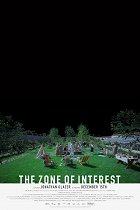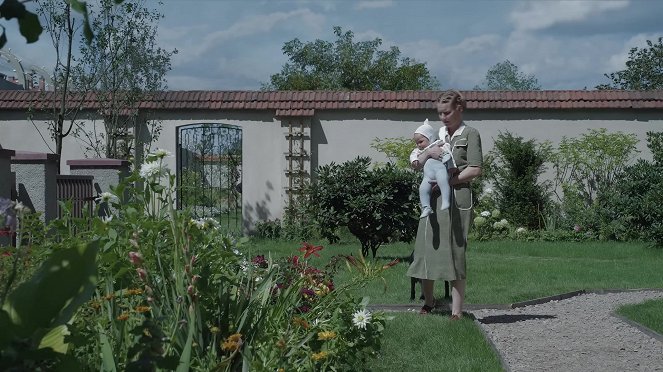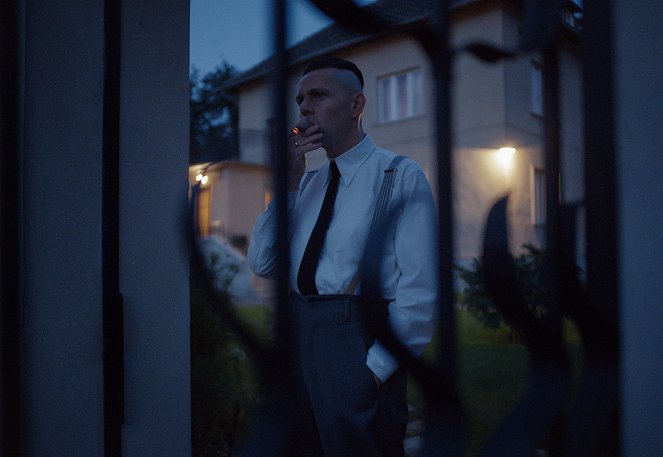Directed by:
Jonathan GlazerScreenplay:
Jonathan GlazerCinematography:
Łukasz ŻalComposer:
Mica LeviCast:
Sandra Hüller, Christian Friedel, Ralph Herforth, Freya Kreutzkam, Max Beck, Ralf Zillmann, Imogen Kogge, Stephanie Petrowitz, Marie Rosa Tietjen (more)VOD (4)
Plots(1)
The commandant of Auschwitz, Rudolf Höss, and his wife Hedwig, strive to build a dream life for their family in a house and garden next to the camp. (SF Studios Fin.)
Videos (4)
Reviews (10)
Jonathan Glazer is again powerfully creative and artsy. In The Zone of Interest, we don’t see a single Auschwitz prisoner in the film or any of the atrocities perpetrated behind the walls of the camp. The minimalistically staged but effectively arranged action takes place inside the Hösses’ villa and in their garden, which is bordered by the wall, over which the tops of the concentration-camp barracks loom. Höss dutifully goes to “work” and spends his free time with his family. Höss’s wife enjoys the flowers in the garden. Their children play by the swimming pool. Höss occasionally receives a visitor on business, such as engineers with a design for a more efficient crematorium. Sometimes someone brings them a bag of nice clothes to pick through... The whole time, we hear the distant droning of the death factory in operation, sometimes people screaming, dogs barking, gunfire. Black clouds of ash fill the sky. The Höss children’s perception of the world outside the house is also evident in small nuances. The little girl’s nocturnal dreams in black-and-white inverted images are the most impressive of the artistic ornaments with which the film is packed to the maximum satisfaction of the festival viewer. The scene with Höss on the stairs with the dark empty corridors is brilliant and the highlight of the film in my opinion. The Zone of Interest is a different view of the Holocaust, with the most unpleasant music you have ever experienced accompanying the closing credits. This puts Jonathan Glazer in the company of masters like Michael Haneke and Yorgos Lanthimos. [Cannes FF]
()
Such is the daily routine of a family of ordinary, decent citizens. They grow kohlrabi and carnations in the garden, keep the house in perfect order, pet the dog and frolic in the swimming pool, and all this is provided by the head of the family, who goes to work every day in an exemplary manner and who - by the way - is the director of the most monstrous concentration camp. He is, again by the way, at work dealing with, for example, the more efficient incineration of Jews in ovens, and does it with the same emotional involvement as when you and your wife are deciding what to buy for dinner at the supermarket. And behind the walls of this middle-class family's property, behind those ominous walls, is a human-scale Mordor where the most monstrous acts against humanity are taking place, and you feel an immense oppression thanks to the ingenious sound work and the ominous visual details in the distance, such as the smoke from the ovens, or from the locomotives bringing in more and more human fuel. The film doesn't shove down your throat horrific imagery about how monstrous the Holocaust is, it does it on a subliminal basis, working with your subconscious, and that actually makes it all the worse. It made me sick, but at the same time I bow down to Jonathan Glazer for this bold cinematic experiment that says more about us humans than you'd expect.
()
We have seen the horrors that took place in concentration and extermination camps many times on the cinema screen, but this time we take an unconventional look from the other side of the wall, at the life of an Auschwitz commander and his family. Well, it's a disgustingly perfect idyll: a lovely home, a beautiful garden with a pool, a house full of servants; the Höss don't lack for anything. What is happening behind the wall is presented to the viewer only in small "icy" details: the young son playing in the beautiful flowering garden and behind him in the house we see only the steam rising from a train arriving at Auschwitz; the family celebrating a birthday in the garden and behind them we see the incinerator in full swing; they are bathing in the river and suddenly ashes start falling down on them. We all know very well what that means, Jonathan Glazer is counting on it, and he manages to create a perfectly chilling contrast. It also presents a picture of a happy family, which is something I thought about many times in the past because I always found it very controversial. We know all too well what monsters the SS could be, but at the same time they could be, and probably were, loving fathers, something that is beautifully portrayed here. Rudolf Höss is a likeable dad (if it weren't for his uniform, he wouldn't be so different from your friends), but then he picks up the phone and starts figuring out how to streamline the final solution to the Jewish question; at a social event his wife asks him who were the people there and he answers that he doesn’t care about the people, that he was thinking how to gas everything, but it was logistically difficult – that was quite hard to stomach. It took me a while to get used to the way the film is shot, it feels a bit documentary-like, and by the end credits I almost ripped my ears off from the accompanying "music" in agony, but it was a very powerful experience. [Festival de Cannes 2023]
()
A formally interesting experiment (being created concurrently with the book of the same name by Martin Amis), drawing attention to a topic that we should have already processed. Many fundamental questions concerning the primary human attitude, such as "How could the main commander of the Auschwitz concentration camp, Rudolf Höss, calmly sleep, go home every day, and peacefully have dinner with his family...?" should not be posed for the first time by a co-produced film. Similarly, the everyday life of Höss's wife, Hedwig, should not surprise or fascinate us for the first time. On the contrary, we should have a rich knowledge of the reality of the war and be able to work with it. Many prominent women from this time have written memoirs, which in many ways only repeat, complement, and explain to us what and why happened in their lives. They serve excellently as memories, especially the memoirs of secretaries Traudl Junge, Brunhilde Pomsel, and Louise Fox. The question of obedience to authorities and blind fulfillment of orders was thoroughly analyzed by Hannah Arendt in her series of reports "Eichmann in Jerusalem: A Report on the Banality of Evil". Furthermore, we should be immune to demonizing the German language itself and always remember that the Third Reich existed for only 12 years and is primarily the language of Goethe, Schiller, and Rilke. It is absurd to what extent the current public is not interested in the new film Terezín, but the Oscar-nominated The Zone of Interest naturally appeals to moral values and interest in the matter. However, if this trendy film brings some understanding even to those viewers who only watch new titles, this concession can be accepted.
()
Zone of disinterest. One of those films that the teacher puts on in history class, but 80% of the students would rather pull out their cell phones and scroll through Instagram because it's almost as boring as regular class. The film is completely empty in terms of information, so it doesn't even serve an educational purpose. We follow the banalities of the daily life of a concentration camp commander and his family. We learn nothing about the characters, the dialogues are cut down to the minimum, Auschwitz is not shown, so again a film for book readers, where the viewer has to figure everything out (fck you!!), it has no script, the atmosphere doesn't work at all, there’s no build-up, no tension or escalated drama between the Nazis, the emotions below zero, and in the end, instead of showing a pile of corpses, they show only shoes. The film is so empty, slow and boring that even if you skips twenty minutes, you won’t miss anything crucial. Son of Saul was thematically similar, but somewhere else. An intimate arthouse of the highest order. 3/10.
()



Ads